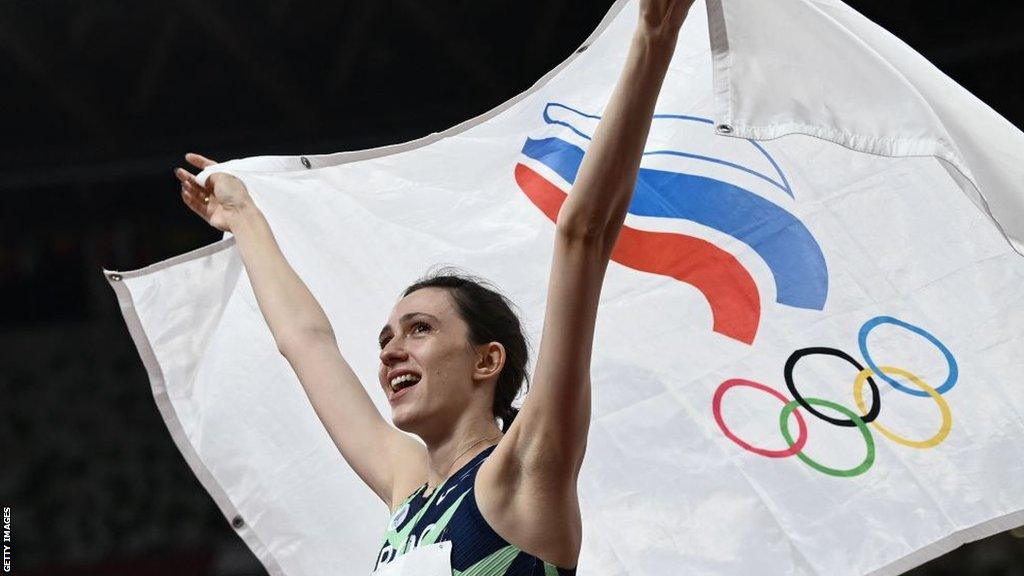Russia: Doping suspension lifted but ban on nation's athletes remains because of Ukraine war
- Published

Russian and Belarusian athletes were permitted to compete at the Tokyo 2020 Games as neutrals
Russia's doping suspension has been lifted - but the nation will remain banned "for the foreseeable future" because of the war in Ukraine, the World Athletics Council has ruled.
Athletes have not been able to compete for Russia since November 2015 after state-sponsored doping was uncovered.
The Russian federation has been reinstated after meeting conditions set by World Athletics' Russia Taskforce.
But athletes remain excluded following Russia's invasion in February 2022.
World Athletics president Sebastian Coe said: "The unprecedented sanctions imposed on Russia and Belarus by countries and industries all over the world appear to be the only peaceful way to disrupt and disable Russia's current intentions and restore peace.
"The death and destruction we have seen in Ukraine over the past year, including the deaths of some 185 athletes, have only hardened my resolve on this matter."
Following three days of World Athletics Council meetings, it was also decided transgender female athletes are to be banned from competing in the female category at international events.
The Russia Taskforce had recommended Russian Athletics Federation's suspension was ended after all the requirements of its reinstatement plan were met.
Rune Andersen, head of the taskforce, said he was satisfied with the "new culture of good governance and zero tolerance for doping throughout the organisation".
The federation will be required to comply with 35 'special conditions' over a period of three years - monitored by the Athletics Integrity Unit - to ensure anti-doping reforms remain in place.
The war in Ukraine saw Russian and Belarusian athletes banned from both the World Athletics Championships in Oregon and the World Athletics Indoor Championships in Belgrade last year.
Athletes, support personnel and officials from Russia and Belarus will remain excluded from World Athletics Series Events.
In addition, Russia will not be permitted to host any international or European athletics events, and it will have no right to attend, speak or vote at meetings of Congress.
Coe added: "The integrity of our major international competitions has already been substantially damaged by the actions of the Russian and Belarusian governments, through the hardship inflicted on Ukrainian athletes and the destruction of Ukraine's sports systems.
"Russian and Belarusian athletes, many of whom have military affiliations, should not be beneficiaries of these actions."
The member federations from Russia and Belarus have the right to respond to the Council's decision.
The initial ban in 2022 followed calls by the International Olympic Committee (IOC) for sports federations to exclude Russian and Belarusian athletes, officials and teams from international events.
However, in contrast to the position of World Athletics, the IOC is exploring a pathway to allow athletes from those nations to compete as neutrals at the 2024 Olympics.
Ukraine has threatened to boycott the Paris Games if a ban on Russian and Belarusian athletes is not upheld.
The World Athletics ruling comes after the European Athletics Council reaffirmed its position last week that Russian and Belarusian athletes should remain banned until the war in Ukraine ends.
The United Kingdom is among more than 30 countries to have pledged support to an ongoing ban on Russian and Belarusian athletes competing in international sporting events.
Culture Secretary Lucy Frazer said: "Today's decision by World Athletics sends a strong message that now is not the time for the International Olympic Committee to plot a route back into competition for Russian and Belarusian athletes funded and selected by their states.
"The situation in Ukraine has worsened since the IOC made its original decision to ban Russian and Belarusian athletes from the Olympic Games as Putin continues to wage his barbaric, illegal war. The IOC needs to agree that the ban must continue."
World Athletics had already suspended the Russian Athletics Federation due to state-sponsored doping, although some of the country's athletes were still allowed to compete as 'authorised neutral athletes' in track and field at the Tokyo 2020 Olympics.
Russia was accused of running a "state-supported" doping programme in a World Anti-Doping Agency (Wada) commission report in 2015.
That ban was upheld in 2019 after Wada declared Russia's Anti-Doping Agency (Rusada) non-compliant for manipulating laboratory data handed over to investigators.
However, the four-year suspension was later reduced by the Court of Arbitration for Sport, until 16 December 2022.